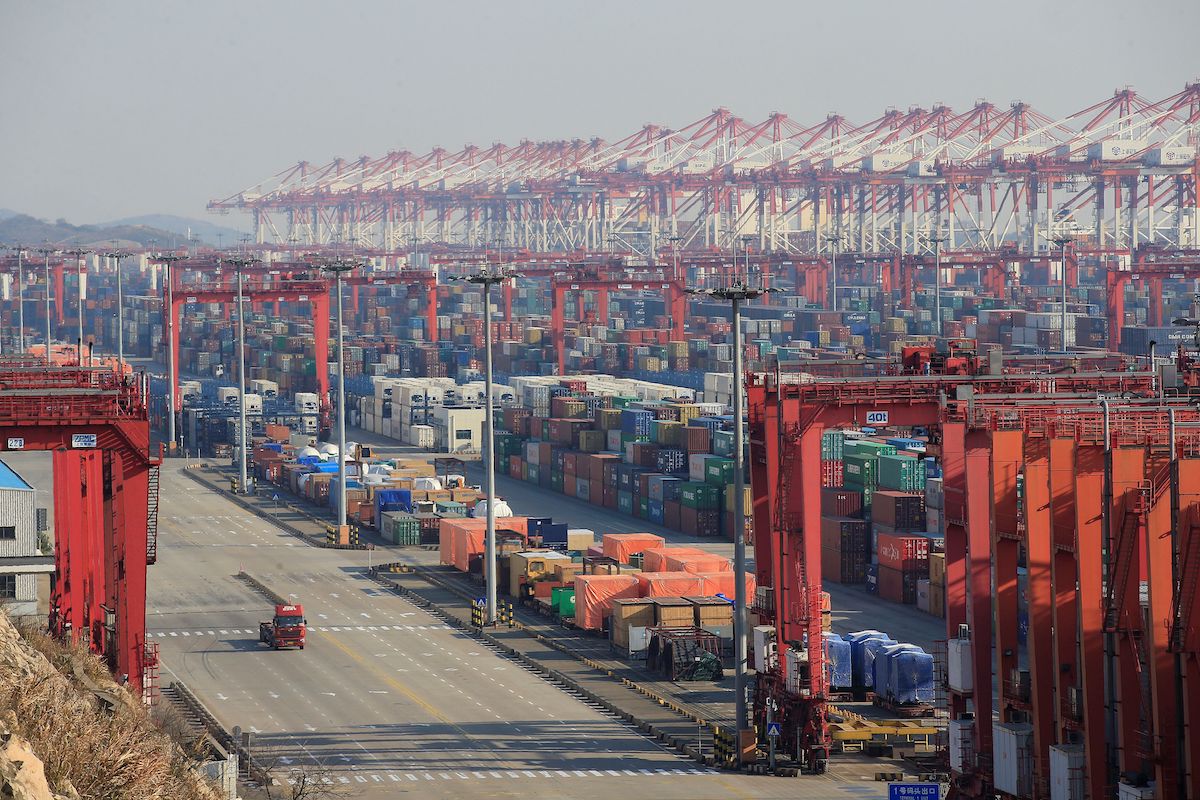FILE PHOTO: Containers are seen at the Yangshan Deep Water Port, part of the Shanghai Free Trade Zone, in Shanghai, China, February 13, 2017. REUTERS/Aly Song/File Photo
 By Karl Plume and Tom Polansek
By Karl Plume and Tom Polansek
CHICAGO, Jan 15 (Reuters) – China’s pledge to buy U.S. farm goods based on “market conditions” during the Phase 1 trade deal signing ceremony on Wednesday added to doubts among farmers and commodity traders over Beijing’s lingering tariffs on U.S. exports.
The agreement, meant to reduce tensions after nearly two years of a tit-for-tat tariff war, included a pledge by China to purchase at least an additional $12.5 billion worth of agricultural goods in 2020 and at least $19.5 billion over the 2017 level of $24 billion in 2021.
President Donald Trump’s insistence on a big commitment to buy farm products was a major sticking point in talks leading up to the signing, people briefed on the negotiations said, as China wanted the freedom to buy based on demand.
Chinese Vice Premier Liu He, standing beside Trump, said on Wednesday that Chinese firms will buy American products “based on market conditions.”
Following the comment, the price of soybeans, the top U.S. farm product shipped to China by value before the trade war, fell to a one-month low on the Chicago Board of Trade futures market.
“Soybeans broke after that,” said Terry Reilly, senior commodities analyst with Futures International. “‘When the market dictates’ means they may not come back for 36 months. Who knows? It means when they need it and the price is right.”
Ted Seifried, chief strategist with brokerage Zaner Group in Chicago, said a lack of specific purchase contracts was also disappointing.
U.S. soybean suppliers will continue to face stiff competition for sales to China from a likely record-large Brazilian crop, which farmers will begin harvesting in the coming weeks.
“I don’t see a huge change happening for us because of the agreement,” said Charlie Zanker, a corn and soybean farmer in Hamburg, Iowa. “It’s a world market now.”
The agreement did not reduce tariffs on major U.S. agricultural exports to China, though Trump said tariffs would come off in a Phase 2 agreement. Pork is subject to a 68% duty even as China needs more imports because of the devastating outbreak of a fatal pig disease.
“We really need the tariffs to go away,” said David Herring, president of the National Pork Producers Council and a hog farmer in Lillington, North Carolina, who attended the signing ceremony.
A senior Trump administration official said later that China will need to issue waivers or adjustments to tariffs to meet its buying commitments.
Chinese traders also expressed doubts over the deal.
“I feel like China is not getting anything out of it,” said one China-based crop trader before the ceremony. “Just spending some money for some peace in return.”
‘OUR WORK ISN’T DONE’
China promised to speed up its review of agricultural biotechnology products it imports to no more than two years, according to the agreement text. Delays of up to seven years in China’s approving new varieties of crops grown from genetically modified seeds have long frustrated the U.S.
“What we really need to see is how China implements this,” said Matt O’Mara, vice president for international affairs for BIO, a trade group that represents seed companies like Bayer AG and BASF SE.
Other hurdles to timely approvals remain, as China still will not begin reviewing a biotech product until it is first approved by another country, O’Mara said.
“Our work isn’t done,” said Bill Gordon, a soybean farmer from Worthington, Minnesota, and president of the American Soybean Association, who also attended the White House signing. “I think you’re going to have a lot of negotiations now and steps to relieve those tariffs.”
China also made concessions to the meat industry. It agreed to eliminate cattle age requirements for beef shipments, and will ease limits on the use of hormones in cattle and rules requiring record-keeping on the animals’ origins, according to the text of the deal.
The changes will make more U.S. beef eligible for export to China, said Kent Bacus, director of international trade and market access for the National Cattlemen’s Beef Association.
“It is a game changer,” he said. “It basically says they recognize the safety of the U.S. system.”
U.S. grain traders Archer Daniels Midland Co and Cargill Inc praised the Phase 1 agreement in separate statements as did seed company Corteva Inc
(Reporting by Karl Plume and Tom Polansek in Chicago Additional reporting by Mark Weinraub and Julie Ingwersen in Chicago, P.J. Huffstutter in Iowa and Hallie Gu in Beijing; Writing by Caroline Stauffer; Editing by Marguerita Choy and Leslie Adler)
(c) Copyright Thomson Reuters 2019.

 Join The Club
Join The Club











